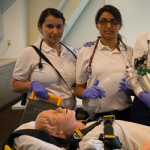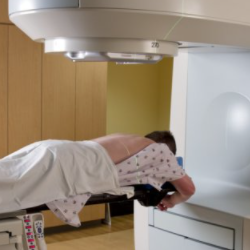What is a Radiation Therapist?
A Radiation Therapist needs to have strength and compassion for others.
The only way to have a successful career in this field is to provide care and be determined to help every patient.
The strong people who work in this career must help cancer patients and other ill patients with therapy using radiation.
This can be very dangerous and scary, making this job that much more important.
The ability to multitask and pay close attention to detail will get you far in this field.
Duties
A Radiation Therapist has an important, and oftentimes sensitive, job title.
With this career, there comes a lot of responsibility.
On a daily basis, a Radiation Therapist will likely:
- Explain treatment plans to the patient
- Answer questions
- Protect patient and yourself from radiation exposure
- Determine where to place the radiation
- Use the equipment to treat the patient
- Monitor the patient
- Keep records of the data
Salary
With a career as a Radiation Therapist, you can expect to make about $82,790 annually.
This is the average salary for Radiation Therapists with an Associate’s degree and certification.
However, when just starting out in this career, you should expect a salary closer to $61,030 a year.
Once you gain experience and more certifications, a Radiation Therapist can make up to $128,550 a year.
Radiation Therapists who work in California make $119,000 a year, while Radiation Therapists working in smaller states, like Michigan, will make closer to $81,000 a year.
Having a job in a large hospital or outpatient center will provide higher salaries as well.
Annually National Average Salary: $110,820
Average Annual Salary by State
| State | Avg. Annual Salary |
|---|---|
| Alabama | $85,670 |
| Alaska | $123,410 |
| Arizona | $108,510 |
| Arkansas | $106,980 |
| California | $158,490 |
| Connecticut | $110,330 |
| Delaware | $120,990 |
| District of Columbia | $105,290 |
| Florida | $95,480 |
| Georgia | $98,460 |
| Idaho | $96,610 |
| Illinois | $111,720 |
| Indiana | $94,660 |
| Iowa | $84,370 |
| Kansas | $89,950 |
| Kentucky | $102,800 |
| Louisiana | $94,140 |
| Maine | $90,860 |
| Maryland | $102,270 |
| Massachusetts | $112,520 |
| Michigan | $89,580 |
| Minnesota | $96,020 |
| Mississippi | $83,470 |
| Missouri | $93,270 |
| Montana | $114,050 |
| Nebraska | $107,920 |
| Nevada | $121,800 |
| New Hampshire | $99,250 |
| New Jersey | $132,650 |
| New York | $129,890 |
| North Carolina | $94,950 |
| North Dakota | $88,380 |
| Ohio | $112,910 |
| Oklahoma | $88,920 |
| Oregon | $125,740 |
| Pennsylvania | $98,170 |
| South Carolina | $97,240 |
| South Dakota | $90,150 |
| Tennessee | $81,740 |
| Texas | $120,540 |
| Utah | $111,490 |
| Vermont | $99,050 |
| Virginia | $109,040 |
| Washington | $159,630 |
| West Virginia | $93,960 |
| Wisconsin | $94,100 |
| Puerto Rico | $40,430 |
Annual Average Salary: Top 5 States
The top earning state in the field is Washington, where the average salary is $159,630.
These are the top 5 earning states in the field:
* Employment conditions in your area may vary.
How to Become a Radiation Therapist
Step 1 Enter a Program
In order to become a certified and registered Radiation Therapist, you will need to have an Associates degree.
These types of programs typically take around two years to complete.
For Radiation Therapists, the average program will require math and science classes.
Some other classes you can expect in a Radiation Therapist program are:
- Anatomy and Physiology
- Nutrition
- Radiologic Patient Care
- Medical Terminology
- Oncology Radiation Biology
Most Associate’s degree programs require students to take clinical labs and externships in order to graduate.
Externships can lead to careers after graduation and can help with hands-on learning through school.
Some of the other types of things you should learn in a Radiation Therapy Associates degree program are:
- Patient psychology
- Oncology skills
- Emergency procedures
In case you are interested in earning a Bachelor’s degree, there are many available for interested Radiation Therapists.
These programs can take another 2-4 years, depending on if your credits transfer from the Associate’s degree program.
Step 2 Become Licensed and Certified
Almost all of the states in the United States require that Radiation Therapists are licensed.
This is to ensure safety for patients and employees alike.
Licensure requirements vary by state, but typically in order to become licensed you must:
- Have a degree from an accredited program
- Be certified by the American Registry of Radiologic Technologists
The ARRT provides certification in many areas for Radiation Therapists.
In order to have access to the ARRT certification, you must have at least an Associate’s degree in radiologic technology.
This certification also requires that you take an exam given by the ARRT.
Some of the areas to study on the ARRT exam include:
- Treatment planning and delivery
- Patient care
- Radiation therapy
- Quality assurance
Once you pass this exam, you will be able to become licensed with the state in which you work.
There are other certifications provided by the ARRT for Radiation Therapists, including certifications in:
- Mammography
- Densitometry
- Sonography
Step 3 Gain Experience
You should have gained some experience working as a Radiation Therapist when you were in school during your externship.
Most employers prefer at least a year of experience in order to be hired.
Working in clinics and hospitals as a Radiation Therapist is a great way to maintain knowledge and education throughout your career.
Those with at least two years of experience can earn more certification or even become promoted into higher paid careers.
Some of the advanced careers to look forward to as a Radiation Therapist include:
- Dosimetrist
- Technical Sales Representative
- Radiation Research Therapist
Hands-on experience is the most important part of this career.
Step 4 Maintain Certification
It’s important to become certified, but it’s even more important to maintain that certification.
This is because things change so much in the medical community, that you will need to stay on top of new treatments and issues in the healthcare world.
The ARRT certification is valid for two years, and once it needs to be renewed you must complete a continued education program and submit a $25 fee.
Licensing expirations can vary by state, so it is important to find out what you need to do from your local hospital.
Keeping up to date on licensure and certification will allow you to work legally and safely in the United States.
Popular Programs
Education
Radiation therapy is a serious treatment that needs special education in order to stay safe.
That is why most Radiation Therapists choose to earn an Associates degree.
This way, they can learn the medical terminology that is crucial for this career, as well as gain hands-on experience through clinical lab work and externships.
Most Associates degrees take around two years to finish, and can often lead to gaining certification and licensing.
The types of classes that you should take through an Associates degree program should fall under science and math.
The typical Radiation Therapist has a degree in Radiography.
The courses that are expected for this type of degree include:
- Healthcare Financial Management
- Radiation Science
- Sectional Anatomy
- Patient Safety
- Healthcare Issues and Trends
- Contrast Media Imaging
With the average Associate’s degree comes the chance to work an externship.
This means that students will go to a radiation therapy lab or clinic in order to gain hands-on experience.
Often, students will not get paid, but instead, gain class credit.
Having the proper education and experience will lead to many more opportunities as a Radiation Therapist.
If you are interested in finding out what other career choices you have beyond an Associate’s degree, then you should think about earning a Bachelor’s degree.
Radiation Therapists with a Bachelor’s degree will often find themselves at the top of their careers.
The types of classes you should expect to take in a Radiation Therapy Bachelors degree program are:
- Treatment Planning
- Medical Terminology
- Anatomy and Physiology
- Pharmacology
- Radiation Protection
Along with a Bachelors degree comes the chance to work in various occupations, including:
- Diagnostic Medical Sonographer
- Nuclear Medicine Technologist
- Cardiovascular Technologist
- CT Technologist
- Vascular Technologist
Earning a Bachelor’s degree should take another 2 to 4 years, depending on if your credits transfer from the Associate’s degree.
Video About The Career
Certification and Licensing
Almost every state requires that Radiation Therapists become licensed and certified.
This is because radiation therapy is a serious treatment and needs special precautions.
In order to become licensed, aspiring Radiation Therapists must take an exam.
Other requirements include:
- Graduation from an accredited program
- At least 500 hours of experience as a Radiation Therapist
This exam is given through the American Registry of Radiologic Technologists, which is also the only accreditation association for Radiation Therapists.
There will be several topics on the exam, including the following:
- Patient care
- Medical record management
- Safety and quality assurance
- Radiation protection
- Procedures and treatments
There are a total of 200 questions on this exam, passing means that you are licensed in the state in which you took the exam.
It is also possible to gain specific certifications through the American Registry of Radiologic Technologists.
Some of the options for certification as a Radiation Therapist through the American Registry of Radiologic Technologists are:
- Bone Densitometry
- Radiography
- Nuclear Medicine Technology
Each of the exams for individual certifications may vary, but typically the tests are around 200 questions.
The different subjects to study for these credentials include:
- Patient care
- Image production
- Procedures
- Ethical and legal actions
All credentials from the American Registry of Radiologic Technologists must be maintained and renewed every 2 years.
In order to maintain certification, you must proof further education and renew registration annually.
Some other types of credentials that are good for Radiation Therapists to obtain are:
- CPR and First Aid
- Continued education classes through your employer
- Specializations in pharmacology or research
Having certification will show employers and patients that you are competent in the field of Radiation Therapy.
Also, being licensed means that you are working legally in the state you live in, so always remember to maintain credentials by furthering your education and complying with ethical standards.
Average Training Program Duration: 1-2 Years
Most training programs to become a Radiation Therapist last around one year.
These can be done online or in-person at local community colleges or trade schools across the country.
The most important aspect of any program is the hands-on experience, so whether you do your schoolwork online or in the classroom, make sure that all of your clinical and externships are in person.
With an Associate’s degree, you can expect to take around two years to become a Radiation Therapist.
Online degrees that are shorter than a year may not give you all of the proper education, so make sure they are accredited by the ARRT.
Job Outlook
Radiation Therapists will see a rise in career opportunities by around 9 percent over the next several years.
This is faster than many other therapy and technician careers.
The reason for this growth is that the baby boomer generation is growing older, which means that there is a higher need for medical care.
This also means that more Radiation Therapists will be retiring over the next decade, making room for new employees in many companies across the United States.
Having proper education and work experience in this career will help with job prospects as well.
Going above and beyond to earn certifications and specializing in a niche can lead to further career opportunities.
Employment Growth Projection: 3%
2023
2033
That's a higher than average projected growth of 500
Should You Become a Radiation Therapist?
Overall Satisfaction: High

It seems that most Radiation Therapists love their jobs.
Most Radiation Therapists make a decent salary, and often only have to work a typically 40-hour workweek.
This doesn’t mean it isn’t stressful, it is, but there are some great things about this career as well.
The fact that a Radiation Therapist helps patients is also another great benefit of this career.
Those with more experience and certifications will likely find higher satisfaction.
When looking for a career as a Radiation Therapist, there may be more satisfactory jobs in smaller offices and clinics because of less stress and patient flow.
Average Salary: High

Radiation Therapists can expect to make quite a bit in salary with the proper education and certification.
With two years of experience, the average Radiation Therapist can expect to make around $82,790 a year.
When just starting out in this career, it’s likely that you will make closer to $61,030, however.
Chances are that after many years of experience and earning certifications, your pay could go above $128,550 a year in some areas.
Those who work in large hospitals and radiation centers will likely find they have higher salaries than people working in smaller clinics.
Job Growth Outlook: Medium

If you are interested in becoming a Radiation Therapist, now is the best time to start your journey.
Over the next decade, this career will grow by around 9 percent.
Much higher than many other careers in the same field.
The reason for this advance in job opportunities is because of the baby boomer generation.
As they grow older, they will require more medical care, including radiation for certain cancers.
Expect to find more job openings in larger populations and big hospitals.
Education Duration: 1-2 Years

It can take a while to become a Radiation Therapist, but that is because it is an important job.
Some online programs offer Radiation Therapists programs that last about one year.
You should expect to take around two years to become a Radiation Therapist with an Associate’s degree.
However, some employers are now requiring Radiation Therapists to have at least a Bachelor’s degree.
This can take another 2-4 years.
All in all, it can take anywhere from 1-4 years to become a Radiation Therapist.
Personal Skills Needed

You must be the type of person who wants to help others in order to be a great Radiation Therapist.
No one with an illness wants to get radiation therapy, so the Radiation Therapist can make it just a little bit brighter.
This can be done by having the following strengths:
- Communication skills
- Physical stamina
- Emotional stability
- Medical knowledge
- Attention to detail
- Empathy and compassion
- Computer and science skills
- Ability to work as a team and alone
- Problem-solving skills
- Critical thinking skills
Frequently Asked Questions
How much does a Radiation Therapist make?
Since radiation therapy is such a crucial part of cancer treatment, Radiation Therapists get paid quite well.
With several years in the field and with proper licensing and certification, you can expect to make around $91,000 as a Radiation Therapist.
Those who have been working in the field for many years and who have the skills to show can make over $100,000 in some areas.
If you are just starting your career as a Radiation Therapist, you can expect to make $57,000 a year on average.
How long does it take to become a Radiation Therapist?
The length of time that it takes to become a Radiation Therapist depends on the type of program you enroll in.
Some programs last about one year, but other programs can last two years or more.
An Associate’s degree can take two years to finish, while a Bachelor’s degree can add on another 2-4 years to that.
It can take anywhere from 1-4 years to become a Radiation Therapist.
What does a Radiation Therapist do?
A Radiation Therapist is a person who is there to help people who are in radiation therapy.
Radiation therapy can be used for treating cancer and other illnesses, which can make patients weak.
Radiation Therapists must ensure that patients are protected, relaxed, and comfortable while they are receiving treatment.
They will also clean and sterilize equipment, and monitor the machinery.
What is the demand for Radiation Therapists?
Over the next several years, we should see a 7 percent increase in this career.
That is because the baby boomer generation is growing older, which means they will need more healthcare and medical procedures.
Advancements in technology have made it easier as well, which means more career opportunities in the future.
Those with certification and proper education will find the most career opportunities.
How much does it cost to become a Radiation Therapist?
Depending on the type of education you receive, it can cost anywhere from $1,500 to $15,000 to become a Radiation Therapist.
Some programs online or accelerated ones from trade schools can cost as little as $1,500 or as much as $3,000.
The average Associate’s degree can cost anywhere from $10,000 to $15,000 depending on the university that you attend.
Those looking to earn a Bachelor’s degree can expect to pay more than $35,000 for education.
Radiation Therapist Resources
- 14 Pros and Cons of Being a Radiation Therapist
- How Much Does Radiation Therapist School Cost?
- Online Radiation Therapist Training Programs
More Medical Careers
| Career | |
|---|---|
 | Certified Nursing Assistant Working as a Certified Nursing Assistant is an entry-level role that will give you hands-on experience when you are ready to take the next step in your medical career. |
 | Dental Assistant Dental assistants help dentists to provide patient care, keep records, and care for the dental equipment. |
 | Dental Hygienist Dental hygienists take care of cleaning teeth to promote hygiene and help avoid cavities and gum problems. |
 | Dialysis Technician Dialysis technicians maintain and monitor dialysis equipment, and also act as primary caregivers for patients undergoing dialysis treatment. |
 | Dog Groomer Dog groomers attend to grooming dogs, usually at dog salons or big pet-related chain stores. |
 | Healthcare Administrator Healthcare administrators – also known as healthcare executives or health services managers – are responsible for the planning, direction, and coordination of medical and health services. |
 | Home Health Aide Home health aides provide home care to individuals who require assistance in their day-to-day living. |
 | Licensed Practical Nurse (LPN) Licensed Practical Nurses provide basic nursing care to patients and work with Registered Nurses and Doctors. |
 | Medical Assistant Medical assistants support the work of physicians, nurses, and other health professionals. |
 | Medical Biller and Coder Medical billers and coders manage, organize, and code various health information data. |
 | Medical Technologist Medical laboratory technologists collect bodily samples and conduct tests to analyze those samples. |
 | Medical Transcriptionist Medical transcriptionists go over voice recordings to convert them into written texts. |
 | Nutritionist As a Nutritionist, you’ll be tasked with creating meal plans, counseling, and understanding dietary restrictions for all types of clients. |
 | Patient Access Representative The work involves helping people to orient themselves to the space and everything that is going on. |
 | Patient Care Technician Patient care techs work directly with patients helping them with daily activities and assist the medical staff by measuring and monitoring the patients' vital signs among other tasks. |
 | Pharmacy Technician Pharmacy technicians provide patients with medications through prescription or over the counter. |
 | Phlebotomist As a Phlebotomist, it will be your responsibility to take blood samples from patients and send them to the lab for further testing. |
 | Physical Therapist Assistant Physical therapist assistants provide physical therapy services to patients and aide to physical therapists. |
 | Professional Recovery Coach A professional recovery coach is a life coach who works with someone during their addiction recovery process. |
 | Registered Health Information Technician Registered Health Information Technician (RHIT) help store and verify accuracy of health records as well as analyze patient data. |
 | Registered Nurse (RN) Registered Nurses provide hands-on patient care in various settings, mainly hospitals, and clinics. |
 | Respiratory Therapist Respiratory therapists treat and care for patients who experience breathing difficulties. |
 | Sterile Processing Technician A sterile processing technician is a healthcare professional who is responsible for preparing, sterilizing, maintaining, packaging, and storing medical tools and equipment used in surgical and other medical procedures. |
 | Surgical Technologist Surgical technologists – also known as operating room techs – prepare operating rooms and assist doctors and nurses during surgical procedures. |
 | Vet Office Manager Veterinary office managers work to make sure that the daily operations run smoothly and efficiently at veterinary hospitals or veterinary clinics. |
 | Veterinary Assistant Veterinary Assistants work closely with Veterinarians to handle routine animal care. |
 | Veterinary Technician Veterinary Technicians assist veterinarians as well as diagnosing and treating animals, mostly in private clinics. |
 | EKG Technician EKG technicians test and monitor the cardiovascular system. |
 | EMT Trained emergency medical technician that arrives at the scene to provide medical services such as resuscitation. |
 | MRI Technologist MRI Technologists use a machine to scan the body and create a detailed image of the inside for doctors to analyze. |
 | Optician Opticians are technicians and salespersons at the same time who spends most of their day talking to customers, reading prescriptions written by doctors, and dispensing glasses and lenses. |
 | Ultrasound Technician Ultrasound technicians aid physicians in monitoring and diagnosing patients through the use of ultrasonic imaging technology. |
 | X-Ray Technician X-Ray Technicians are medical imaging professionals who use technology to visualize the inside of our bodies. |













